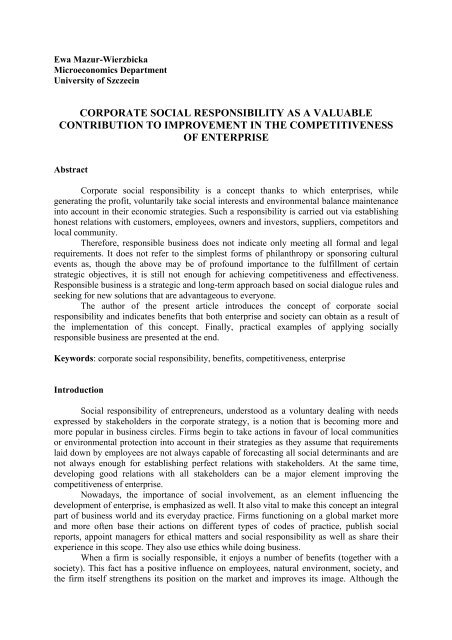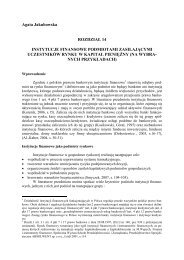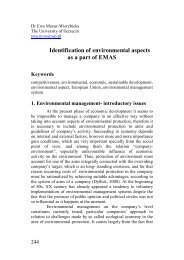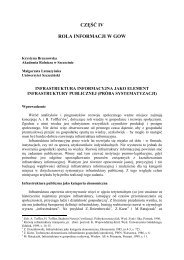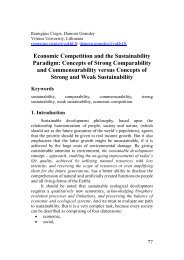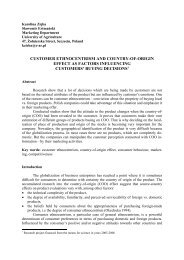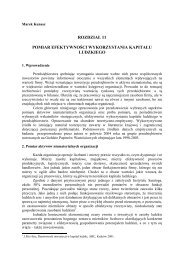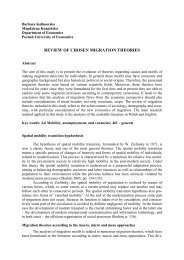corporate social responsibility as a valuable contribution to ...
corporate social responsibility as a valuable contribution to ...
corporate social responsibility as a valuable contribution to ...
Create successful ePaper yourself
Turn your PDF publications into a flip-book with our unique Google optimized e-Paper software.
Ewa Mazur-Wierzbicka<br />
Microeconomics Department<br />
University of Szczecin<br />
CORPORATE SOCIAL RESPONSIBILITY AS A VALUABLE<br />
CONTRIBUTION TO IMPROVEMENT IN THE COMPETITIVENESS<br />
OF ENTERPRISE<br />
Abstract<br />
Corporate <strong>social</strong> <strong>responsibility</strong> is a concept thanks <strong>to</strong> which enterprises, while<br />
generating the profit, voluntarily take <strong>social</strong> interests and environmental balance maintenance<br />
in<strong>to</strong> account in their economic strategies. Such a <strong>responsibility</strong> is carried out via establishing<br />
honest relations with cus<strong>to</strong>mers, employees, owners and inves<strong>to</strong>rs, suppliers, competi<strong>to</strong>rs and<br />
local community.<br />
Therefore, responsible business does not indicate only meeting all formal and legal<br />
requirements. It does not refer <strong>to</strong> the simplest forms of philanthropy or sponsoring cultural<br />
events <strong>as</strong>, though the above may be of profound importance <strong>to</strong> the fulfillment of certain<br />
strategic objectives, it is still not enough for achieving competitiveness and effectiveness.<br />
Responsible business is a strategic and long-term approach b<strong>as</strong>ed on <strong>social</strong> dialogue rules and<br />
seeking for new solutions that are advantageous <strong>to</strong> everyone.<br />
The author of the present article introduces the concept of <strong>corporate</strong> <strong>social</strong><br />
<strong>responsibility</strong> and indicates benefits that both enterprise and society can obtain <strong>as</strong> a result of<br />
the implementation of this concept. Finally, practical examples of applying <strong>social</strong>ly<br />
responsible business are presented at the end.<br />
Keywords: <strong>corporate</strong> <strong>social</strong> <strong>responsibility</strong>, benefits, competitiveness, enterprise<br />
Introduction<br />
Social <strong>responsibility</strong> of entrepreneurs, unders<strong>to</strong>od <strong>as</strong> a voluntary dealing with needs<br />
expressed by stakeholders in the <strong>corporate</strong> strategy, is a notion that is becoming more and<br />
more popular in business circles. Firms begin <strong>to</strong> take actions in favour of local communities<br />
or environmental protection in<strong>to</strong> account in their strategies <strong>as</strong> they <strong>as</strong>sume that requirements<br />
laid down by employees are not always capable of forec<strong>as</strong>ting all <strong>social</strong> determinants and are<br />
not always enough for establishing perfect relations with stakeholders. At the same time,<br />
developing good relations with all stakeholders can be a major element improving the<br />
competitiveness of enterprise.<br />
Nowadays, the importance of <strong>social</strong> involvement, <strong>as</strong> an element influencing the<br />
development of enterprise, is emph<strong>as</strong>ized <strong>as</strong> well. It also vital <strong>to</strong> make this concept an integral<br />
part of business world and its everyday practice. Firms functioning on a global market more<br />
and more often b<strong>as</strong>e their actions on different types of codes of practice, publish <strong>social</strong><br />
reports, appoint managers for ethical matters and <strong>social</strong> <strong>responsibility</strong> <strong>as</strong> well <strong>as</strong> share their<br />
experience in this scope. They also use ethics while doing business.<br />
When a firm is <strong>social</strong>ly responsible, it enjoys a number of benefits (<strong>to</strong>gether with a<br />
society). This fact h<strong>as</strong> a positive influence on employees, natural environment, society, and<br />
the firm itself strengthens its position on the market and improves its image. Although the
20 Ewa Mazur-Wierzbicka<br />
concept is widely discussed in academic circles, during conferences, symposiums and in<br />
publications (always a theoretical b<strong>as</strong>is), it is put in<strong>to</strong> practice <strong>to</strong> a small extent. All the more<br />
should this concept be emph<strong>as</strong>ized and discussed on the forum of firms that have<br />
implemented it and enjoy benefits accruing from this fact. Unfortunately, there are also many<br />
firms that, apart from declarations and propagating the idea of responsible business, do not<br />
have very much <strong>to</strong> do with the concept of responsible business. Nevertheless, it is expected<br />
that stakeholders will verify such behavior f<strong>as</strong>t.<br />
Concept of <strong>corporate</strong> <strong>social</strong> <strong>responsibility</strong> – main issues<br />
The origins of responsible business were connected with philanthropy and the United<br />
States where the first modern firm w<strong>as</strong> established. At the end of the 19 th century, an idea<br />
emerged in the US, that had become particularly popular during the period of the Great<br />
Depression, according <strong>to</strong> which businessmen should be responsible <strong>to</strong> society. Modern view<br />
on <strong>corporate</strong> <strong>social</strong> <strong>responsibility</strong> (CSR) appeared in the 1950’s thanks <strong>to</strong> Howard Bowen. In<br />
“Social Responsibilities of the Businessman” he explained that business activity affected<br />
ordinary people and society and so business ought <strong>to</strong> take such actions that would be coherent<br />
with <strong>social</strong> objectives and values. In the following years, it had been shown that <strong>corporate</strong><br />
<strong>social</strong> <strong>responsibility</strong> drew businessmen’s attention <strong>to</strong> special relations between a businessman<br />
and society, of which the firm should be aware.<br />
In the 1960’s and 1970’s, a discussion on ethics in business <strong>to</strong>ok place in the USA,<br />
which laid foundations of modern <strong>to</strong>ols such <strong>as</strong>, e.g. <strong>social</strong> audit.<br />
At first, the concept of <strong>corporate</strong> <strong>social</strong> <strong>responsibility</strong> w<strong>as</strong> not well-known in Europe<br />
and did not arouse much interest due <strong>to</strong> a different way in which EU Member States divided<br />
their national income. However, the concept h<strong>as</strong> become more and more popular also in<br />
Europe <strong>as</strong> a result of growing competitive advantage of the USA and more and more frequent<br />
difficulties with offering <strong>social</strong> guarantees of Welfare State.<br />
Both in the USA and Europe, theory w<strong>as</strong> put in<strong>to</strong> practice. In the 1990’s new trends<br />
and concepts such <strong>as</strong> sustainable development or <strong>corporate</strong> citizenship were developed.<br />
Nowadays, the center of gravity in the development of CSR h<strong>as</strong> been transferred from the<br />
United States <strong>to</strong> Europe (Great Britain in particular where the government h<strong>as</strong> even appointed<br />
a Minister for CSR).<br />
In order <strong>to</strong> analyze how CSR concept had been developing, one might follow through<br />
(after Rok, 2004) three ways that had led <strong>to</strong> the construal of responsible business models.<br />
The first one w<strong>as</strong> the concept of sustainable development that appeared in the 1960’s<br />
and 1970’s. According <strong>to</strong> it, development processes began <strong>to</strong> be analyzed holistically and<br />
unders<strong>to</strong>od not only <strong>as</strong> economic indica<strong>to</strong>rs but also <strong>as</strong> environmental and <strong>social</strong> ones. The<br />
main argument calling for this concept w<strong>as</strong> the fact that during the period of the Cold War<br />
humankind unders<strong>to</strong>od dangers in not so much military terms (resulting from the pursuing of<br />
ideological policy by the United States and the USRR) <strong>as</strong> in terms of global dangers resulting<br />
from limited natural resources and also large-scale exploitation of these resources.<br />
Furthermore, the category of profit, hither<strong>to</strong> belonging only <strong>to</strong> the economic world, found its<br />
reflection also in other dimensions, namely environmental (where profit began <strong>to</strong> be defined<br />
<strong>as</strong> conditions favorable environmentally <strong>to</strong> the existence of people and communities) and<br />
<strong>social</strong> dimensions (in the c<strong>as</strong>e of which profit w<strong>as</strong> unders<strong>to</strong>od <strong>as</strong> <strong>social</strong> bonds in local<br />
community, friendly climate for community members in the form of, e.g. employment). The<br />
aforementioned change in comprehending the role of enterprise resulted from the <strong>as</strong>sumption<br />
according <strong>to</strong> which economy w<strong>as</strong> not an au<strong>to</strong>nomous sphere of life, which meant that it w<strong>as</strong><br />
not separated from society. As a consequence, it w<strong>as</strong> concluded that economic sphere of life<br />
w<strong>as</strong> an integral part of society.
Corporate Social Responsibility <strong>as</strong> a Valuable Contribution <strong>to</strong> Improvement ... 21<br />
The second way involved civil pressure expressed by the fact that citizens were not<br />
very willing <strong>to</strong> enable enterprises <strong>to</strong> take actions contradic<strong>to</strong>ry <strong>to</strong> their everyday life. In other<br />
words, capitalism oriented only <strong>to</strong> making a profit began <strong>to</strong> criticized <strong>as</strong> a result of human<br />
rights development and civil society. Consumer movement, environmental protection<br />
movement or animal rights protection movement played a profound role in these actions.<br />
The third way w<strong>as</strong> connected with business self-regulation. Most of all, <strong>social</strong><br />
movement appeared within capitalism and business itself, and referred <strong>to</strong> the reduction in<br />
corruption and frauds in business, greater transparency and the occurrence of so-called<br />
positive practices, i.e. relations with clients or relations with consumers (Rok, 2004).<br />
Globalization processes that <strong>to</strong>ok place until the end of the 1980’s were the next giant<br />
step in the development of this notion. It w<strong>as</strong> then that enterprises and organizations became<br />
an equal ac<strong>to</strong>r in international economic and political relations. This led not only <strong>to</strong> the<br />
reduction in the role of state but also imposed a new philosophy, with reference <strong>to</strong><br />
communities or ac<strong>to</strong>rs in whom the capital w<strong>as</strong> invested, on enterprises and particularly on<br />
MNC’s (Multinational Corporations) and TNC’s (Transnational Corporations). E<strong>as</strong>y flow of<br />
capital, that is controlled by corporations, contributes also <strong>to</strong> the fact that, among other things,<br />
capital is recalled from are<strong>as</strong> in which no profit accrues <strong>to</strong> a corporation, however, certain<br />
<strong>social</strong> problems and questions are left behind in communities in the form of, for instance<br />
unemployment. Therefore, the <strong>responsibility</strong> faced by corporations when their profits are very<br />
often higher or equal <strong>to</strong> the country in which they make investments and pursue their policies<br />
began <strong>to</strong> be emph<strong>as</strong>ized.<br />
Globalization is also caused by fiscal pressure on public institutions, which h<strong>as</strong><br />
contributed <strong>to</strong> the fact that a new form of cooperation between <strong>social</strong> partnership (so-called<br />
public private partnership) and its role in development h<strong>as</strong> been established. Therefore, there<br />
is a growing awareness of adapting this form of partnership <strong>to</strong> activities of firms. In other<br />
words, people have begun <strong>to</strong> think in different terms recently, which indicates that<br />
<strong>responsibility</strong> for the functioning of society is accepted not only by governmental structures<br />
but also by other ac<strong>to</strong>rs such <strong>as</strong> enterprises.<br />
In the era of globalization, one cannot forget about the evolution of <strong>social</strong> awareness,<br />
and hence greater importance of intangible values. Reflective current stresses new features<br />
determining long-term competitiveness of firms such <strong>as</strong> ability <strong>to</strong> create and develop<br />
trademarks b<strong>as</strong>ed on values cherished by key <strong>social</strong> groups (Moeller, Eldar, 2003).<br />
Fac<strong>to</strong>rs such <strong>as</strong> globalization, new forms of cooperation between business and public<br />
authorities and incre<strong>as</strong>ing <strong>social</strong> awareness of values in economy and <strong>social</strong> life developed<br />
thinking in terms of <strong>responsibility</strong>.<br />
Drawing up the general guidelines for MNC’s during OECD forum in 1976 w<strong>as</strong> an<br />
example of the above ide<strong>as</strong>. The guidelines referred <strong>to</strong> the following spheres: employment<br />
relations, corruption elimination, environmental protection and consumer protection. On the<br />
other hand, rules about conducting economic activity were introduced in 1994 during<br />
international business environment by the so-called Caux Round Table. These rules referred<br />
<strong>to</strong> the following issues (Rok, 2004):<br />
• <strong>responsibility</strong> <strong>to</strong> stakeholders,<br />
• no acting against the law<br />
• respect for the environment<br />
• supporting multilateral trade<br />
• respect for legal regulations<br />
• beyond the letter of the law <strong>to</strong>ward trust<br />
• <strong>to</strong>ward innovations, justice and world community.<br />
Despite uniform trends and tendencies, it is possible <strong>to</strong> differentiate between American<br />
and European models of CSR. In the c<strong>as</strong>e of the former, charity work and philanthropy of
22 Ewa Mazur-Wierzbicka<br />
enterprises are mainly highlighted, which means that while generating economic profit, firms<br />
allocate a part of it <strong>to</strong> local communities, citizens or other ac<strong>to</strong>rs (beneficiaries). Nevertheless,<br />
European current h<strong>as</strong> criticized the above model. In Europe, community w<strong>as</strong> not unders<strong>to</strong>od<br />
<strong>as</strong> homo economicus that reduced the activity of enterprises only <strong>to</strong> financial <strong>as</strong>sistance but in<br />
a holistic way in which <strong>responsibility</strong> w<strong>as</strong> unders<strong>to</strong>od more <strong>as</strong> actions referring <strong>to</strong> <strong>social</strong><br />
issues in every sense of the word. Responsibility <strong>as</strong>sumed by an enterprise is its sustained<br />
activity in a local community demonstrated by, for example participation in <strong>social</strong> actions or<br />
continuous cooperation with public authorities. Nevertheless, the development and character<br />
of CSR model depends on Welfare model adopted in particular European countries. It is<br />
<strong>as</strong>sumed that the scope and range of firms’ involvement in local communities reflects Welfare<br />
models and socio-political structures across Europe.<br />
In 2001, i.e. a year after the Lisbon Strategy, European Commission presented Green<br />
Paper on Corporate Social Responsibility. This concept h<strong>as</strong> become one of elements<br />
important <strong>to</strong> economic policy of the EU. It is defined <strong>as</strong> a concept of voluntary including<br />
<strong>social</strong> t<strong>as</strong>ks in the scope of environmental protection among enterprise’s regular business<br />
practice and relations with all interested partners (after Communication from the Commission<br />
concerning Corporate Social Responsibility: Business Contribution <strong>to</strong> Sustainable<br />
Development, COM (2002) 347 dated July 2, 2002). Hence, responsible business combines<br />
individual entrepreneurial tendencies and attitude necessary <strong>to</strong> set up and run a small<br />
company in a wider context of <strong>social</strong> <strong>responsibility</strong> (Responsible Business, 2004).<br />
As stated by Rok (Rok, 2004), this idea introduced major changes <strong>to</strong> economic policy<br />
due <strong>to</strong> greater and greater <strong>social</strong> expectations and changing consumer awareness, due <strong>to</strong> the<br />
need for reliable economic policy pursued by the EU and due <strong>to</strong> a long-term economic<br />
efficiency of enterprises. Therefore, an <strong>as</strong>sumption h<strong>as</strong> been made that propagating the civil<br />
attitudes in enterprises provides better conditions for the competitiveness of European<br />
economy. Another important <strong>as</strong>sumption refers <strong>to</strong> the fact that responsible business forms a<br />
b<strong>as</strong>is for management strategy that, through <strong>social</strong> dialogue at a local level, contributes <strong>to</strong><br />
global competitiveness and at the same time offers conditions favorable <strong>to</strong> <strong>social</strong> and<br />
economic development.<br />
Philosophy of <strong>corporate</strong> <strong>social</strong> <strong>responsibility</strong> construed in such a way h<strong>as</strong> found its<br />
reflection in, among other things, strategic and long-term approach b<strong>as</strong>ed on <strong>social</strong> dialogue<br />
and looking for solutions favorable <strong>to</strong> everyone.<br />
CSR is defined in many different ways. For instance, according <strong>to</strong> Davis and Blomstrom,<br />
<strong>social</strong> <strong>responsibility</strong> should be treated <strong>as</strong> the obligation of the management of a corporation <strong>to</strong><br />
take such decisions and actions that contribute both <strong>to</strong> attention <strong>to</strong> its own interest<br />
(multiplying the profit made by enterprise) <strong>as</strong> well <strong>as</strong> protection and multiplication of <strong>social</strong><br />
welfare (Davis, Blomstrom, 1975).<br />
Bowen claims that CSR is a duty imposed on entrepreneur <strong>to</strong> pursue such a policy of decision<br />
making or following such a path that would lead <strong>to</strong> achieving a desirable goal and a value <strong>to</strong><br />
society (Carroll, 1999).<br />
According <strong>to</strong> Frederik, <strong>social</strong> <strong>responsibility</strong> indicates that a businessman should forec<strong>as</strong>t such<br />
actions of economic system so that he would be able <strong>to</strong> meet <strong>social</strong> expectations (Frederick,<br />
1960).<br />
All the aforementioned definitions of CSR encomp<strong>as</strong>s a clear attitude <strong>to</strong>ward fair rules of<br />
running business in the context of <strong>social</strong> response and creating a <strong>social</strong> <strong>contribution</strong> <strong>as</strong> well <strong>as</strong><br />
cause and effect relationship between behavioral patterns adopted and mechanisms for<br />
making decisions <strong>to</strong> the advantage of society.<br />
Hence, it is clear that the concept of CSR may be defined in a number of ways. One<br />
may make attempt <strong>to</strong> systemize these definitions and <strong>as</strong>sume that first of all, CSR is defined<br />
via generating sustainable profit and establishing relations with all stakeholders. Secondly, it
Corporate Social Responsibility <strong>as</strong> a Valuable Contribution <strong>to</strong> Improvement ... 23<br />
is a management <strong>to</strong>ol. Thirdly, it is a philosophy of conducting business activity on the b<strong>as</strong>is<br />
of relations with ac<strong>to</strong>rs, among others, with employees, clients, suppliers, shareholders,<br />
competi<strong>to</strong>rs and local community. Fourthly, it refers <strong>to</strong> the development of competitive<br />
advantage on the market that would be b<strong>as</strong>ed on providing sustainable value. Fifthly, it is<br />
aimed at providing services and products in the way that does not damage natural and <strong>social</strong><br />
environment. Sixthly, it is related <strong>to</strong> running the business while taking ethical values in<strong>to</strong><br />
account. Seventhly, it is nothing more than running the business in accordance with <strong>social</strong><br />
expectations. Finally, it is aimed at making a <strong>contribution</strong> <strong>to</strong> sustainable development through<br />
cooperation with employees.<br />
The above definitions are b<strong>as</strong>ed on the concept of a firm oriented <strong>to</strong> stakeholders –<br />
<strong>social</strong> groups and individuals that can influence or are affected by enterprise via its products,<br />
strategies and manufacturing processes, management systems and procedures.<br />
The notion of a stakeholder is of key importance in the model of <strong>corporate</strong> <strong>social</strong><br />
<strong>responsibility</strong>. It is one of the most important notions <strong>as</strong> it encomp<strong>as</strong>ses all the ac<strong>to</strong>rs<br />
participating in the game, i.e. actions taken by enterprises <strong>to</strong> create a community.<br />
Defined in such a way, <strong>corporate</strong> <strong>social</strong> <strong>responsibility</strong> is a process, i.e. a constantly<br />
changing series of events. It refers <strong>to</strong> relations among financial, <strong>social</strong> and environmental<br />
<strong>responsibility</strong>. In practice, financial investments made by enterprises are aimed not only at<br />
creating organizational structures but also at looking after the environment in which they<br />
function <strong>as</strong> well <strong>as</strong> <strong>social</strong> conditions (for instance, jobs, close relations with local community<br />
or public authorities). It is directly related with ‘Triple Bot<strong>to</strong>m Line’ approach whose main<br />
idea emph<strong>as</strong>izes the organization of sustainable development and security, which minimizes<br />
negative environmental influence. That being so, the model of <strong>corporate</strong> <strong>social</strong> <strong>responsibility</strong><br />
(CSR) may be defined <strong>as</strong> a participation in sustainable development (Observa<strong>to</strong>ry Survey<br />
2002). In other words, CSR is defined <strong>as</strong> a voluntary integration of <strong>social</strong> and environmental<br />
issues in enterprises and their relations with stakeholders.<br />
Corporate <strong>social</strong> <strong>responsibility</strong> model may have a conscious or unconscious form. In<br />
the former c<strong>as</strong>e, ac<strong>to</strong>rs have knowledge and are characterized by taking <strong>responsibility</strong> for<br />
themselves, their enterprises and environment. However, the form of <strong>social</strong>ly responsible<br />
activity that is unconscious can be found in practice <strong>as</strong> well. This is refers <strong>to</strong> taking actions<br />
connected with stakeholders and <strong>social</strong> or environmental involvement. Nevertheless, ac<strong>to</strong>rs do<br />
not have knowledge of CSR and/or are not aware of the fact that the activity should be<br />
undertaken in accordance with <strong>as</strong>sumptions made.<br />
Furthermore, it is also worth indicating internal and external dimensions of CSR. The<br />
former involves human resource management, ethical programmes for employees, industrial<br />
safety, ability <strong>to</strong> adjust <strong>to</strong> changes, environmental protection management, <strong>corporate</strong><br />
supervision rules.<br />
External dimension of CSR refers <strong>to</strong> local community that determines the rules<br />
concerning the cooperation with NGO and other organizations such <strong>as</strong> contracting partners<br />
and cus<strong>to</strong>mers. In this c<strong>as</strong>e, it is also vital <strong>to</strong> recognize human rights or global environmental<br />
programmes, which derives from the <strong>as</strong>sumption that enterprises are an integral element of<br />
local communities, and at the same time community is defined administratively, with<br />
prospects of enterprise’s functioning and prospects of a cluster, i.e. cooperating enterprises.<br />
These three dimensions of localness make up the definition of local community in which<br />
enterprise in engaged (Moelle, Eldar 2003).<br />
Apart from Green Paper, another document on <strong>corporate</strong> <strong>social</strong> <strong>responsibility</strong> w<strong>as</strong><br />
White Paper. White Paper: Communication on CSR presents actions in the following spheres:<br />
a) education – actions consisting in the exchange of experience and good practices<br />
(examining the influence of CSR on business and the environment, exchange of CSR<br />
experience among firms, development of managerial skills);
24 Ewa Mazur-Wierzbicka<br />
b) development of <strong>corporate</strong> <strong>social</strong> <strong>responsibility</strong> <strong>to</strong>ols (ethical code, management<br />
standards, product labelling, <strong>social</strong>ly responsible investments);<br />
c) initiating the European Multi-stakeholder Forum;<br />
d) CSR included in all EU policies – employment policy, economic policy,<br />
environmental policy, consumer policy and foreign policy (Rok, 2004).<br />
In this c<strong>as</strong>e, the model of <strong>social</strong> <strong>responsibility</strong> w<strong>as</strong> combined with the Lisbon Strategy<br />
which intended growth in European economy until 2010 via, among other things, the<br />
improvement in the competitiveness of economy. European Campaign on Corporate Social<br />
Responsibility 2005 conducted by CRS Europe is one of effects produced by the Lisbon<br />
Strategy. The campaign is aimed at:<br />
• disseminating the idea of <strong>corporate</strong> <strong>social</strong> <strong>responsibility</strong> in business circles;<br />
• propagating good examples of implementing responsible practices in business;<br />
• education of present and future leaders.<br />
As CSR is going <strong>to</strong> be verified in practice, circles interested in this matter have created<br />
indica<strong>to</strong>rs showing the presence of CSR in particular enterprises. As far <strong>as</strong> the literature on<br />
the subject is concerned, the following indica<strong>to</strong>rs are mentioned:<br />
• economic – e.g. investment indica<strong>to</strong>r, innovativeness, R&D outlays<br />
• environmental – w<strong>as</strong>te disposed, number of times that environmental norms have been<br />
broken<br />
• employee-related – average female wage/salary, the wage differential, ratio between<br />
training budget and operational costs, number of employees participating in training,<br />
percentage of employees organized in labour unions, number of new employees<br />
• industrial safety – hospitalized accidents/number of employees, sick notes expressed<br />
in hours, number of car accidents/hours worked<br />
• <strong>social</strong> involvement – funds for <strong>social</strong> projects, number of projects received from <strong>social</strong><br />
organizations, tax rates and local charges<br />
• referring <strong>to</strong> relations with business partners – average time within which invoices are<br />
paid, number of suppliers’ jobs supported, number of complaints accepted.<br />
Benefits accruing from using CSR<br />
Benefits accruing from running responsible business are enjoyed both by firms and<br />
society. They depend on obligations taken on by firms <strong>to</strong> a large extent. However, one should<br />
remember that <strong>social</strong> <strong>responsibility</strong> begins where the influence of the law ends. Speaking of<br />
real CSR, one means making various forms of investments in community or the environment<br />
voluntarily.<br />
Benefits enjoyed by firms and society depend <strong>to</strong> a great extent on the level of<br />
obligations incurred by firms that implement systems of <strong>social</strong> <strong>responsibility</strong>. As far <strong>as</strong> the<br />
model presenting different motivation for <strong>as</strong>suming such obligations is concerned, it is<br />
possible <strong>to</strong> distinguish three levels though it is not always plausible <strong>to</strong> determine motivation<br />
explicitly (at the second and third levels in particular).<br />
The first level of <strong>responsibility</strong> refers <strong>to</strong> taking <strong>social</strong> or environmental actions<br />
required by the law. These actions are not programmes in the scope of CSR (in the true sense<br />
of the word) but obviously in a <strong>social</strong> sense and they reflect well on a firm. Examples of such<br />
actions are <strong>as</strong> follows: paying wages/salaries on time, complying with labour legislation,<br />
conforming <strong>to</strong> emission norms. Then, it is an imposed <strong>responsibility</strong> that results from the<br />
necessity <strong>to</strong> obey legal regulations.<br />
The second level refers <strong>to</strong> all the projects carried out and aimed at reducing the<br />
negative effects that the activity of enterprise have on natural environment or <strong>social</strong><br />
environment both internal <strong>as</strong> well <strong>as</strong> external. These projects are not required by the law and
Corporate Social Responsibility <strong>as</strong> a Valuable Contribution <strong>to</strong> Improvement ... 25<br />
are managed voluntarily. They are usually a response <strong>to</strong> pressure from employees, nongovernmental<br />
organizations or local authorities. The following actions can be quoted <strong>as</strong><br />
examples here: organizing a system of employee transport <strong>to</strong> the place of work, providing<br />
workers with soundproof screen even if noise level does not exceed permissible levels,<br />
organizing the kindergarten for employees’ children. In this c<strong>as</strong>e, it is an imposed<br />
<strong>responsibility</strong> taken on <strong>as</strong> a result of pressure from society but in the interest of a firm.<br />
The third level <strong>as</strong>sumes making various forms of investments in community or the<br />
environment voluntarily. These are the programmes initiated by a firm that reflect a long-term<br />
concern for <strong>social</strong> and economic development of a particular region, and improvement in<br />
inhabitants’ standard of living. In this c<strong>as</strong>e, it is possible <strong>to</strong> talk about conscious <strong>responsibility</strong><br />
when enterprise undertakes initiative <strong>as</strong> a result of its sense of “citizenship” (<strong>corporate</strong><br />
citizenship). Actions taken by a firm in accordance with <strong>social</strong> <strong>responsibility</strong> rules may bring<br />
a number of various benefits, namely external (referring <strong>to</strong> environment of a firm) and<br />
internal (referring <strong>to</strong> relations inside a firm and its employees). Society enjoys certain benefits<br />
<strong>as</strong> well. The scale of these benefits depends on taken within <strong>social</strong> <strong>responsibility</strong> and the level<br />
of obligations taken on the scope of actions by the management. Social expectations are<br />
becoming greater and greater with market development and maturity. The more firms accept<br />
conscious <strong>responsibility</strong> connected with the creation of <strong>social</strong> value added, the less<br />
considerable benefits accrue from <strong>as</strong>suming only imposed <strong>responsibility</strong>. Table 1 shows<br />
benefits accruing from CSR and enjoyed by firms and society.<br />
Table 1. Benefits accruing from running responsible business<br />
Benefits Type Description<br />
<strong>to</strong> a firm<br />
Growing interest from<br />
inves<strong>to</strong>rs<br />
Greater loyalty from<br />
consumers and<br />
stakeholders<br />
Improvement in<br />
relations with<br />
community and local<br />
authorities<br />
Firms that take <strong>social</strong> dimension in<strong>to</strong> account in their strategies can<br />
have e<strong>as</strong>ier access <strong>to</strong> financing. Credi<strong>to</strong>rs are more interested in the<br />
cooperation with firms that, apart from good financial results, are at<br />
the same time managed in a transparent way, create their image and<br />
relations with environment responsibly, than with the ones which<br />
do not do so. For many inves<strong>to</strong>rs, financial reliability of a firm<br />
depends on its <strong>social</strong> reliability.<br />
Greater <strong>social</strong> awareness of consumers leads <strong>to</strong> the fact that while<br />
making a choice, they are guided by the trust they have in a<br />
particular firm and its image. Modern consumer is more and more<br />
often an aware consumer. Apart from fair price and good quality,<br />
he/she expects a product or service <strong>to</strong> have positive <strong>as</strong>sociations. A<br />
larger group of consumers pays attention <strong>to</strong> the “ecological” values<br />
of product or service, if a firm obeys the rules of <strong>social</strong><br />
<strong>responsibility</strong> while creating them <strong>as</strong> well <strong>as</strong> the general standing of<br />
a business.<br />
Participation of firm in the life of local community <strong>as</strong> well <strong>as</strong><br />
making long-term and notable <strong>social</strong> investments facilitate its<br />
effective and peaceful functioning. Social <strong>responsibility</strong> enables a<br />
firm <strong>to</strong> become deeply rooted in community and win favour with<br />
its members and also local authorities’ trust.<br />
Improvement<br />
competitiveness<br />
in<br />
Introduction of responsible business rules is one of advantages<br />
thanks <strong>to</strong> which firms win competitive advantage. For Polish firms,<br />
transparent CSR policy may be one of means for establishing their<br />
position on world markets where expectations about meeting<br />
responsible business standards are much more confident.
26 Ewa Mazur-Wierzbicka<br />
Improvement in<br />
organizational culture of<br />
a firm<br />
Through taking up the challenges from <strong>social</strong> <strong>responsibility</strong>, a firm<br />
improves its standards of behaviour <strong>to</strong>ward stakeholders<br />
(employees, contrac<strong>to</strong>rs, clients), and hence avoids costs of “bad<br />
partnership”. These changes shape organizational culture of a firm<br />
b<strong>as</strong>ed on trust, <strong>responsibility</strong> and transparency for all the interested.<br />
Developing the positive<br />
image of a firm among<br />
employees<br />
Social <strong>responsibility</strong> of a firm is one of elements of non-financial<br />
motivating the employees. Thanks <strong>to</strong> ethical codes, <strong>social</strong><br />
programmes and attention <strong>to</strong> the environment, the image of a firm<br />
improves in employee’s eyes. Employees recognize the functioning<br />
of a firm when they see that a part of its activity is oriented <strong>to</strong><br />
solving crucial – also <strong>to</strong> them – <strong>social</strong> problems.<br />
<strong>social</strong><br />
Recruiting and keeping<br />
the best employees<br />
Exposing and solving<br />
major <strong>social</strong> problems<br />
Education of society<br />
When the image of a firm improves and it enjoys greater<br />
employees’ trust, a firm becomes more attractive on a labour<br />
market, which enables it <strong>to</strong> attract new and keep the best<br />
employees.<br />
Firms may occupy a crucial role in solving major <strong>social</strong> problems.<br />
Supporting and initiating <strong>social</strong> campaigns or programmes, they<br />
contribute <strong>to</strong> exposing of a given problem, engaging in civil<br />
conduct, reducing the scale of a problem or even solving it.<br />
Through actions that are in accordance with <strong>social</strong> <strong>responsibility</strong><br />
standards, firms promote these rules in the business world and<br />
make other contracting partners <strong>as</strong> well <strong>as</strong> competi<strong>to</strong>rs apply them.<br />
They also have an effect on citizens – consumers, and make them<br />
aware of the weight of such issues <strong>as</strong> <strong>responsibility</strong> in economic<br />
life, fair competition, attention <strong>to</strong> natural environment, <strong>to</strong>lerance<br />
and respect for human rights.<br />
Improvement in the<br />
state of natural<br />
environment<br />
Access <strong>to</strong> information<br />
concerning a firm<br />
Carrying out environmental programmes, firms help protect natural<br />
environment and contribute <strong>to</strong> its improvement and reduction in<br />
pollution level. They often engage in educational actions aimed at<br />
incre<strong>as</strong>ing the environmental awareness.<br />
Such actions <strong>as</strong> the publication of data concerning the<br />
<strong>responsibility</strong> strategy of a firm <strong>to</strong> its stakeholders in the form<br />
<strong>social</strong> report, external audit carried out in a firm, and also the<br />
presentation of concrete results of a firm in environmental, <strong>social</strong><br />
and economic spheres are major fac<strong>to</strong>rs motivating <strong>to</strong> achieve<br />
better and better results and carry out more and more well-though<strong>to</strong>ut<br />
<strong>social</strong> programmes.<br />
Respect for human<br />
rights<br />
Introduction of ethical codes and training in<strong>to</strong> a firm and<br />
responsible management of human resources create a common<br />
<strong>social</strong> ground on which more considerable weight is attached <strong>to</strong> the<br />
recognition of fundamental human rights.<br />
Source: b<strong>as</strong>ed on Rok, B.: Odpowiedzialny biznes w nieodpowiedzialnym świecie,<br />
www.gazeta-it.pl (November 15, 2007)<br />
In mallenbaker.net portal, information about the survey conducted for IBM w<strong>as</strong><br />
presented. The survey referred <strong>to</strong> the influence of CSR on development, policy and image of<br />
firms and c.a. 250 largest world enterprises participated in it.<br />
The results of the survey show that <strong>corporate</strong> <strong>social</strong> <strong>responsibility</strong> helps firms be more<br />
competitive on the market. 68 per cent of respondents stated that paying attention <strong>to</strong> CSR w<strong>as</strong><br />
helpful in making larger sums of money, and 54 per cent believed that it gave them a free
Corporate Social Responsibility <strong>as</strong> a Valuable Contribution <strong>to</strong> Improvement ... 27<br />
hand while competing. About three fourths of respondents stated they provided their<br />
shareholders and other partners with better access <strong>to</strong> information on their campaigns from<br />
now on.<br />
Firms that invest in CSR may emph<strong>as</strong>ize their <strong>contribution</strong> <strong>to</strong> a particular venture and<br />
present benefits they gain from such actions right away. Besides, such firms are perceived <strong>as</strong><br />
modern enterprises that establish standards, understand cus<strong>to</strong>mers and respond <strong>to</strong> their needs,<br />
<strong>as</strong> well <strong>as</strong> pay attention <strong>to</strong> the effect exerted by products they manufacture (mallenbaker.net,<br />
2008).<br />
Nevertheless, a kind of superficiality can be noticed in the c<strong>as</strong>e of <strong>corporate</strong> <strong>social</strong><br />
<strong>responsibility</strong> rules. More is said about <strong>responsibility</strong> than done. Hence, firms implementing<br />
the integral <strong>responsibility</strong> programmes face even a greater challenge. Furthermore, it should<br />
be stated that declarations not supported by actions may bring loss <strong>to</strong> a firm <strong>as</strong> <strong>social</strong><br />
awareness of different groups of stakeholders is growing f<strong>as</strong>t. Especially if they find out that<br />
there are firms that really act responsibly.<br />
In practice, before firms present solemn declarations concerning the implementation of<br />
<strong>social</strong> <strong>responsibility</strong> concept, they should analyse certain issues and elements helpful in the<br />
creation of <strong>social</strong> <strong>responsibility</strong> management system. These issues are <strong>as</strong> follows (Rok, 2007):<br />
1. Identification of key external and internal stakeholders.<br />
2. Development of a long-term plan and mission of a firm paying attention <strong>to</strong> values<br />
important <strong>to</strong> <strong>corporate</strong> strategy.<br />
3. Formulation of priorities in the scope of <strong>social</strong> policy.<br />
4. Appointing persons responsible for pursuing the <strong>social</strong> policy (managerial staff and<br />
employees from particular departments).<br />
5. Analysis of hither<strong>to</strong> existing programmes and obligations taken on by a firm <strong>to</strong> groups of<br />
stakeholders in recent years.<br />
6. Detailed analysis of <strong>social</strong> <strong>responsibility</strong> strategies in firms under consideration (in trades).<br />
7. Organization of meetings with representatives of the most important groups of stakeholders<br />
in order <strong>to</strong> get <strong>to</strong> know mutual expectations.<br />
8. Formulation of <strong>social</strong> policy rules.<br />
9. Establishing specific principles on the b<strong>as</strong>is of existing determinants (legal regulations,<br />
voluntary obligations, operational aims, financial outlays).<br />
10. Development and implementation of strategies with reference <strong>to</strong> particular groups of<br />
stakeholders.<br />
11. Proper communication and information in the scope of <strong>social</strong> policy.<br />
12. Training and advisory services in the scope of <strong>social</strong> policy pursued.<br />
13. Establishing and selecting methods for indica<strong>to</strong>r <strong>as</strong>sessment (KPI – key performance<br />
indica<strong>to</strong>rs, i.e. selection of key instructions).<br />
14. Reporting (writing down the rules, ways of realization, results).<br />
15. Control and review of results by managers – external audit.<br />
16. Involving the suppliers in the programme (determination of expectations and suggestions).<br />
17. Improvement in human resources management system in enterprises.<br />
18. Propagation of rules among all the stakeholders (everyone treated equally).<br />
19. Open door policy and external communication (<strong>social</strong> reports, publications, lectures,<br />
seminars).<br />
20. Recognizing <strong>social</strong> policy and external policy <strong>as</strong> key elements in organizational policy,<br />
involving groups of stake holders in management.<br />
One should also pay attention <strong>to</strong> the fact that (despite many benefits accruing from<br />
CSR and firms that will really put CSR concept in practice) behaviour of some firms will not<br />
be in accordance with CSR rules. This consists mainly in the fact that some firms become<br />
involved in <strong>social</strong> initiatives in order <strong>to</strong> improve their image or regain the standing of a
28 Ewa Mazur-Wierzbicka<br />
business. The largest oil companies are very often criticized for, among other things,<br />
destroying the environment in countries where they extract. Royal Dutch Shell is criticized<br />
mainly for its involvement in Nigeria. According <strong>to</strong> Greenpeace, activity of this oil company<br />
h<strong>as</strong> caused serious damage <strong>to</strong> the environment in the Niger delta and ended in a tragedy of<br />
Ogoni tribe inhabiting this area. Shell is also accused of using its influences in this country<br />
and crushing the resistance of native people. At the same time, the company in question<br />
propagates a sustainable exploitation of energy and environmental protection, is involved in<br />
the fulfilment of the UN Millennium Development Goals and invests in biodiversity. This is<br />
one of examples showing a situation in which a firm takes actions <strong>to</strong> improve its image via<br />
“cosmetic changes”. Such “good deeds” differ from CSR in that the former are not voluntarily<br />
but only necessary actions aimed at the reconstruction or improvement in the standing of a<br />
business.<br />
Improving the competitiveness of enterprises thanks <strong>to</strong> CSR – practical examples<br />
Although CSR is usually examined in the context of large enterprises, it is also a<br />
strategic <strong>to</strong>ol for improving the competitiveness of SME. However, certain effects are very<br />
often difficult <strong>to</strong> me<strong>as</strong>ure and some time may p<strong>as</strong>s before they are notable. CSR may affect<br />
the competitiveness of SME positively in the following ways:<br />
• Development of products and/or production results in greater cus<strong>to</strong>mer satisfaction<br />
and loyalty<br />
• Stronger motivation and greater loyalty from employees translates in<strong>to</strong> greater<br />
creativity and innovativeness<br />
• Greater publicity <strong>as</strong> a result of awards received and/or whispered marketing<br />
• Better position on the labor market and e<strong>as</strong>ier cooperation with business partners and<br />
public administration, and e<strong>as</strong>ier access <strong>to</strong> public funds resulting from positive image<br />
of a firm<br />
• Cost savings and larger profit due <strong>to</strong> more effective allocation of human and<br />
production resources<br />
• Incre<strong>as</strong>e in turnover/sales via winning competitive advantage <strong>as</strong> a result of the<br />
aforementioned <strong>as</strong>pects<br />
Practical approach <strong>to</strong> CSR may have diverse character and does not have <strong>to</strong> be complex<br />
or connected with large financial outlays. SME are usually active in one or several CSR<br />
spheres (holistic approach). Main CSR spheres under examination include market, employees,<br />
society, environment.<br />
Market<br />
Employees<br />
CSR in European SME<br />
Environment<br />
Society<br />
Holistic approach
Corporate Social Responsibility <strong>as</strong> a Valuable Contribution <strong>to</strong> Improvement ... 29<br />
The first sphere involves CSR actions addressed <strong>to</strong> employees. Initiatives addressed <strong>to</strong><br />
employees deals with the following:<br />
• improvement in working conditions (taken industrial safety in<strong>to</strong> account) and<br />
professional satisfaction<br />
• balance between professional and private life<br />
• equal opportunities, diversity of training and professional development of employees<br />
(including career planning)<br />
• communication/informing employees and involving them in decision making process<br />
in a firm<br />
• responsible and fair remuneration or financial <strong>as</strong>sistance <strong>to</strong> the employed (e.g. systems<br />
of old-age insurances, interest-free loans)<br />
Behavior of such firms <strong>as</strong> “denkstatt GmgH” from Austria and “MELBUD Sp. z. o.o.” from<br />
Poland can be quoted <strong>as</strong> examples of CSR actions addressed <strong>to</strong> employees in European SME.<br />
A small advisory company “denkstatt GmgH” from Austria provides its employees with fruit<br />
and milk free of charge and employees cook healthy dishes <strong>to</strong>gether during working hours.<br />
Furthermore, the firm offers a possibility of taking a “nap” (a short 20 minutes long<br />
regeneration sleep). Pot plants create family and friendly atmosphere.<br />
“MELBUD Sp. z o.o.” from Poland, a medium-sized enterprise from construction industry,<br />
h<strong>as</strong> an internal <strong>social</strong> fund from which cultural, educational and sport packages for employees<br />
(e.g. Christm<strong>as</strong> vouchers) are financed. The best employees can raise a loan the repayment of<br />
which may be partly remitted. Employees have a feeling of professional stability and also<br />
identify with a firm. This, in turn, creates better atmosphere and greater involvement.<br />
The second CSR sphere are actions addressed <strong>to</strong> society. Initiatives undertaken by<br />
firms in this scope may refer <strong>to</strong>:<br />
• <strong>social</strong> integration and/or integration with labour market at the level of community<br />
• improvement in local infr<strong>as</strong>tructure<br />
• financial or material <strong>as</strong>sistance from local public institutions (e.g. schools, hospitals,<br />
groups acting in favour of environmental protection, cultural institutions, sports and<br />
recreations centers, etc.)<br />
• support for society unders<strong>to</strong>od in a wider context (e.g. population in developing<br />
countries)<br />
In practice, actions taken by firms in favour of society can be observed e.g. in “S<strong>to</strong>rmberg<br />
AS” firm from Norway or in Polish firm “Toolbox Creative Communications”.<br />
“S<strong>to</strong>rmberg AS”, a small wholesale warehouse from Norway, recruits at le<strong>as</strong>t 25 % of its<br />
employees among persons whose situation on the labour market is unfavourable. At the<br />
moment, almost 30 % of its employees are ex-prisoners, students expelled from schools or<br />
persons who cope with drug addiction. The firm h<strong>as</strong> loyal employees and benefits from their<br />
small rotation and low level of absence. Only four employees have left firm since it w<strong>as</strong><br />
established, i.e. since 1998.<br />
A small PR agency “Toolbox Creative Communications (TCC)” provides non-governmental<br />
organization acting in favour of Polish-Jewish dialogue (through promoting cultural diversity<br />
and teaching <strong>to</strong>lerance via education) with PR services (e.g. contacts with the media,<br />
organization of press conferences, creation of websites or cooperation with journalists) free of<br />
charge. The firm h<strong>as</strong> established new contacts and won new cus<strong>to</strong>mers. Furthermore, more<br />
than ten paragraphs about CRS actions taken by the firm have been published in specialist<br />
(PR & Marketing) websites.<br />
Market is another CSR sphere taken in<strong>to</strong> account. CSR actions directed <strong>to</strong> this sphere<br />
involve cus<strong>to</strong>mers on the one hand, and business partners and suppliers on the other hand.<br />
Particular ventures may deal with:<br />
• actions aimed at improving the quality and safety of products
30 Ewa Mazur-Wierzbicka<br />
• providing cus<strong>to</strong>mers with volunteer services<br />
• fair price policy<br />
• ethical advertising activity<br />
• regulation of obligations <strong>to</strong>ward suppliers and business partners on time<br />
• cooperation with local partners<br />
• propagation of standards via supply chains<br />
• support for reaching local/regional business agreements.<br />
“Opteam” firm from Finland and “Deante Antczak Sp.J.” from Poland can be cited <strong>as</strong><br />
practical examples.<br />
“Opteam”, a medium-sized firm, is a franchise network of personal services that pays special<br />
attention <strong>to</strong> individual situation of particular employees by offering them flexible employment<br />
conditions which make them are adjusted <strong>to</strong> needs identified by employees and hence<br />
rotation of employees is minimized. Furthermore, the firm provides workers with special<br />
training programmes.<br />
“DEANTE Antczak Sp.J.” is a medium-sized enterprise from Poland that deals with<br />
wholesale of kitchen and bathroom products and offers cus<strong>to</strong>mers a seven-year guarantee for<br />
products sold – longer than it is usually offered on the market. Moreover, cus<strong>to</strong>mers are<br />
provided with effective technical and guarantee service. Thanks <strong>to</strong> good image (equated with<br />
a high quality of products), the firm h<strong>as</strong> gained new clients and reduced the rotation of<br />
employees.<br />
Another sphere involves CSR actions in favour of natural environment. CSR<br />
initiatives in the scope of environmental protection refer <strong>to</strong>:<br />
• designing environment friendly products and production processes<br />
• effective exploitation of resources<br />
• reducing w<strong>as</strong>te produced and pollution emitted<br />
• using the ”environmental <strong>as</strong>sessment” of suppliers in the context of environmental<br />
standards<br />
• informing business partners, cus<strong>to</strong>mers and society about issues relating <strong>to</strong><br />
environmental protection<br />
CSR actions taken by European SME in favour of environmental protection can be observed<br />
in “Maja’s Salong” firm from Norway and “LUMAG Sp. z o.o.” from Poland.<br />
A small hairdresser’s “Maja’s Salong” from Norway puts CSR rules in<strong>to</strong> practice by<br />
managing the w<strong>as</strong>te in the way that involves their sorting and recycling, saving the energy by<br />
turning off the lights at night, and by using only <strong>as</strong> much water, shampoo and hair cosmetics<br />
<strong>as</strong> necessary. Furthermore, the firm is actively involved in establishing the environmental<br />
standards for the sec<strong>to</strong>r in which it functions. These actions are of great value not only from<br />
the environmental point of view but also allow <strong>to</strong> save money through cost reduction.<br />
“LUMAG Sp. z o.o.” is a medium-sized Polish enterprise functioning in au<strong>to</strong>motive sec<strong>to</strong>r<br />
that manages not only w<strong>as</strong>te produced within a firm but also collects and recycles its products<br />
once they have been used up and removed from vehicles. Elements created <strong>as</strong> a result of<br />
recycling may be used <strong>as</strong> a component of materials for the production of new elements of<br />
breaking systems. What is more, <strong>as</strong>bes<strong>to</strong>s h<strong>as</strong> never been used in the production process, and<br />
prescriptions worked out in firm’s labora<strong>to</strong>ry do not contain any heavy metals that could pose<br />
a danger <strong>to</strong> natural environment or vehicle users. Firm h<strong>as</strong> a good reputation in the opinion of<br />
local community and is perceived <strong>as</strong> honest and thriving enterprise.<br />
Many small and medium-sized enterprises do not focus only on one sphere of CSR but<br />
represent a holistic approach. i.e. combine various <strong>as</strong>pects of these actions. Norway firm “AS<br />
Marex” and Romanian company “SC TUV KARPAT SRL” are examples of enterprises that<br />
have adopted holistic approach <strong>to</strong> CSR in European SME.
Corporate Social Responsibility <strong>as</strong> a Valuable Contribution <strong>to</strong> Improvement ... 31<br />
“AS Marex” is a medium-sized Norwegian enterprise that supports charity every year and<br />
cares about the environment (e.g. sorts and recycles w<strong>as</strong>te), guarantees sustainable<br />
employment, provides its employees with medical care and training, and offers jobs <strong>to</strong><br />
persons who need professional training. “SC TUV KARPAT SRL” is a counselling micro<br />
enterprise from Romania that offers its employees training, looks after the improvement in<br />
their working environment (e.g. modern computers, flexible working hours, greater security)<br />
and mutual communication. It devotes a lot of attention <strong>to</strong> cus<strong>to</strong>mers, and services it provides<br />
are adjusted <strong>to</strong> quality standards established by the firm itself. Furthermore, business partners<br />
are taken in<strong>to</strong> account in firm’s training plans and the firm h<strong>as</strong> been awarded ISO 14001<br />
certificate and organizes training courses in the scope of environmental issues (KMU<br />
Forschung Austria, 2005).<br />
CSR concept is becoming more and more important <strong>to</strong> small and medium<br />
entrepreneurs in the business world. Putting the concept in<strong>to</strong> practice is becoming more and<br />
more common, which is reflected in the fact that the number of entrepreneurs participating in<br />
“Fair Play Enterprise” contest is growing every year (in 1998. there were 39 firms – winners,<br />
where<strong>as</strong> in 2007 this number w<strong>as</strong> 721). It also turns out that firms are more willing <strong>to</strong> involve<br />
in these actions when the atmosphere is favourable <strong>to</strong> ethical behaviour. This fact is<br />
connected, among other things, with changes in public opinion, <strong>social</strong> involvement, spreading<br />
the message of firms, that conduct their activity in accordance with ethical rules, in the media.<br />
It is also very important <strong>to</strong> encourage ethical behaviour and introduce changes within<br />
organizations through training. Thanks <strong>to</strong> external audit, firms and stakeholders can find out<br />
that the concept h<strong>as</strong> been put in<strong>to</strong> practice. Firms awarded are certain that economic success<br />
must go hand in hand with moral success. Awards for entrepreneurs who stand out are in a<br />
way an incentive for other firms <strong>to</strong> act in a moral way.<br />
Conclusion<br />
CSR is developing in various ways depending on a sec<strong>to</strong>r, geographical area and legal<br />
system, due <strong>to</strong> which every country <strong>as</strong> well <strong>as</strong> every firm are unique. It w<strong>as</strong> <strong>as</strong>sumed that CSR<br />
is a voluntary activity that goes beyond legal norms. Yet, different policy is pursed in e.g. the<br />
United States and different in Europe. Corporate <strong>social</strong> <strong>responsibility</strong> is connected with<br />
relation between business and society. This relation w<strong>as</strong> subject <strong>to</strong> change <strong>as</strong> a result of<br />
changes brought about <strong>to</strong> business by globalization. Business had <strong>to</strong> find the way in which it<br />
could respond <strong>to</strong> new <strong>social</strong> expectations and face up a new role.<br />
CSR concept does not concern only large firms (<strong>as</strong> it is suggested by the word<br />
“<strong>corporate</strong>”) but also <strong>to</strong> small and medium-sized ones, which is usually referred <strong>to</strong> <strong>as</strong><br />
responsible entrepreneurship. What is more, CSR is becoming more and more universal <strong>as</strong> a<br />
<strong>social</strong> <strong>responsibility</strong> (SR) in which sustainable development plays a major role and which<br />
refers <strong>to</strong> various organizations, i.e. not only firms but also non-governmental organizations or<br />
government departments.<br />
Contrary <strong>to</strong> appearances, CSR is a complex domain <strong>as</strong> it concerns economy, society<br />
<strong>to</strong>gether with its values, power relations in <strong>corporate</strong> environment and relations between a<br />
firm and its external environment.<br />
In practice, CSR is developing dynamically, which is reflected in strategic<br />
implementation of CSR in firms. Besides, applying CSR principles h<strong>as</strong> a positive effect on the<br />
competitiveness of SME sec<strong>to</strong>r. It allows <strong>to</strong> improve products due <strong>to</strong> which cus<strong>to</strong>mers are<br />
more satisfied and loyal. Stronger motivation and greater involvement of employees translates<br />
in<strong>to</strong> greater creativity and innovativeness. A positive image of a firm is created and hence the<br />
situation in the labour market is improving and cooperation with business partners is<br />
becoming greater and greater. Thanks <strong>to</strong> the aforementioned <strong>as</strong>pects, sales incre<strong>as</strong>e and
32 Ewa Mazur-Wierzbicka<br />
competitive advantage is gained.<br />
REFERENCES:<br />
1. Bowen H. R., Social Responsibilities of the Businessman, Harper &Row, New York<br />
1953, after: A. B. Carroll, Corporate Social Responsibility, “Business and Society”,<br />
Chicago 1999, September, no. 38 ( 3)<br />
2. Communication from the Commission concerning Corporate Social Responsibility,<br />
(2002), Business Contribution <strong>to</strong> Sustainable Development, COM (2002) 347 dated July 2<br />
3. Davis K., Blomstrom R., ( 1975), Business and Society, Environment and Responsibility,<br />
3 ed., McGraw-Hill, New York<br />
4. Frederick W. C., ( 1960), The Growing Concern Over Business Responsibility,<br />
“California Management Review”<br />
5. KMU FORSCHUNG AUSTRIA, (2005), Austrian Institute for SME Research (KMU<br />
FORSCHUNG AUSTRIA) <strong>as</strong> a part of “CSR and Competitiveness - European SMEs'<br />
Good Practice" project. The project h<strong>as</strong> been financed by European Commission,<br />
Enterprise and Industry Direc<strong>to</strong>rate-General, <strong>as</strong> a part of Specific Call for Proposal<br />
"Mainstreaming Corporate Social Responsibility (CSR) Among SMEs" contest, Grant<br />
Programme.<br />
6. Moeller K., Eldar T., (2003), Corporate Responsibility Towards Society: A local<br />
Perspective. European Foundation for the Improvement of Living and Working<br />
Conditions. Dublin.<br />
7. Observatiory of European Survey SME’s 2002/No 4<br />
8. Report: Resposnible Business ( 2004), Warsaw<br />
9. Rok B., (2004), Responsible Business in Irresponsible Word. Akademia Rozwoju<br />
Filantropii w Polsce. Forum Odpowiedzialnego Biznesu. Warszawa<br />
10. Rok B., (2007) Odpowiedzialny biznes w nieodpowiedzialnym świecie. www.gazeta-it.pl<br />
,accessed on November 15<br />
11. mallenbaker.net 2008. 03. 04.


